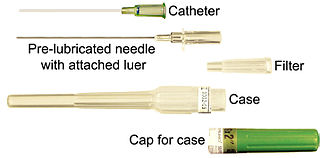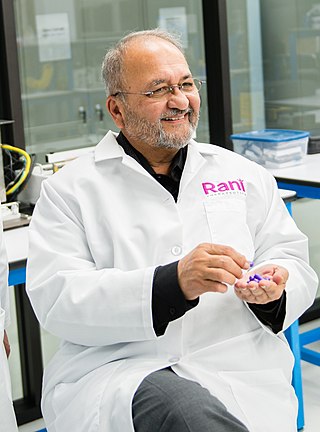
In medicine, a catheter is a thin tube made from medical grade materials serving a broad range of functions. Catheters are medical devices that can be inserted in the body to treat diseases or perform a surgical procedure. Catheters are manufactured for specific applications, such as cardiovascular, urological, gastrointestinal, neurovascular and ophthalmic procedures. The process of inserting a catheter is called catheterization.
Abbott Laboratories is an American multinational medical devices and health care company with headquarters in Green Oaks, Illinois, United States. The company was founded by Chicago physician Wallace Calvin Abbott in 1888 to formulate known drugs; today, it sells medical devices, diagnostics, branded generic medicines and nutritional products. It split off its research-based pharmaceuticals business into AbbVie in 2013.

Medtronic plc is an American-Irish medical device company. The company's operational and executive headquarters are in Minneapolis, Minnesota, and its legal headquarters are in Ireland due to its acquisition of Irish-based Covidien in 2015. While it primarily operates in the United States, it operates in more than 150 countries and employs over 90,000 people. It develops and manufactures healthcare technologies and therapies.

Cardiac catheterization is the insertion of a catheter into a chamber or vessel of the heart. This is done both for diagnostic and interventional purposes.

Boston Scientific Corporation (BSC), headquartered in Watertown, Massachusetts and incorporated in Delaware, is a biomedical/biotechnology engineering firm and multinational manufacturer of medical devices used in interventional medical specialties, including interventional radiology, interventional cardiology, peripheral interventions, neuromodulation, neurovascular intervention, electrophysiology, cardiac surgery, vascular surgery, endoscopy, oncology, urology and gynecology. Boston Scientific is widely known for the development of the Taxus Stent, a drug-eluting stent which is used to open clogged arteries. With the full acquisition of Cameron Health in June 2012, the company also became notable for offering a minimally invasive implantable cardioverter-defibrillator (ICD) which they call the EMBLEM subcutaneous implantable defibrillator (S-ICD).
St. Jude Medical, Inc. was an American global medical device company headquartered in Little Canada, Minnesota, U.S., a suburb of Saint Paul. The company had more than 20 principal operations and manufacturing facilities worldwide with products sold in more than 100 countries. Its major markets include the United States, Europe, Latin America and Asia-Pacific. The company was named after Jude the Apostle, the patron saint of lost causes.

A drug-eluting stent (DES) is a tube made of a mesh-like material used to treat narrowed arteries in medical procedures both mechanically and pharmacologically. DES is inserted into a narrowed artery using a balloon. Once the balloon inside the stent is inflated, the stent expands, pushing against the artery wall, keeping the artery open, thereby improving blood flow. The mesh design allows cells to grow through and around it, securing it in place.

Anthony J. Adducci was a pioneer of the medical device industry in Minnesota. He is best known for co-founding Cardiac Pacemakers, Inc., the company that manufactured the world's first lithium battery-powered artificial pacemaker. The lithium-iodide cell revolutionized the medical industry and is now the standard cell for pacemakers.
Cordis is an American international medical company that develops and manufactures medical devices for diagnostics and interventional procedures to treat coronary and peripheral vascular diseases. The company operates in the North America, Europe, Middle East, Africa, Asia-Pacific, and Latin America markets.

Mir A. Imran, is an Indian medical inventor, entrepreneur and venture capitalist. Imran has formed over 20 medical device companies since the early 1980s and holds over 400 patents. He is known for his role in developing the world's first implantable cardiac defibrillator.
Morton Maimon Mower was an American cardiologist specializing in electrophysiology and the co-inventor of the automatic implantable cardioverter defibrillator. He served in several professional capacities at Sinai Hospital and Cardiac Pacemakers Inc. In 1996, he became the chairman and chief executive officer of Mower Research Associates. He was inducted into the National Inventors Hall of Fame in 2002 for the development of the automatic implantable cardioverter defibrillator with Michel Mirowski in the 1970s. He continued his research in the biomechanical engineering laboratories at Johns Hopkins University.
Biotronik is a limited partnership multi-national cardiovascular biomedical research and technology company, headquartered in Berlin, Germany.
Ron Waksman is a cardiologist. He is the Associate Director, Division of Cardiology, Washington Hospital Center (WHC) and professor of medicine (cardiology) at Georgetown University.
OrbusNeich Medical Group Holdings Limited (OrbusNeich) ( or-bəs-NEESH) is a company that designs, develops, manufactures and markets medical devices for the treatment of vascular diseases.
Dr. Frederic Moll is a physician, medical device developer and entrepreneur, specializing in the field of medical robotics.

Corindus, Inc. was founded in Israel in 2002 by Rafael Beyar, an interventional cardiologist, and his student at the Technion, Tal Wenderow. The company's original goal was to use remote control and robotics to move coronary guidewires and balloon/stent catheters.

Cardiac Pacemakers, Inc. (CPI), doing business as Guidant Cardiac Rhythm Management, manufactured implantable cardiac rhythm management devices, such as pacemakers and defibrillators. It sold microprocessor-controlled insulin pumps and equipment to regulate heart rhythm. It developed therapies to treat irregular heartbeat. The company was founded in 1971 and is based in Saint Paul, Minnesota, and is presently a subsidiary of Boston Scientific.

Shlomo Ben-Haim is an Israeli-born professor of medicine, a serial entrepreneur specializing in the fields of healthcare and biotech, and a philanthropist. He is the co-founder of Biosense Inc., Spectrum Dynamics LLC., Radiancy Inc., X-Technologies, Impulse Dynamics, InStent Inc., Disc-O-Tech Ltd. and EPD Solutions Ltd. He is the inventor of about 560 patents and patent applications.
Eckhard U. Alt is a German scientist and physician known for his contributions in cardiology and research.
MicroPort is a multinational medical technology developer and manufacturer that is primarily headquartered in Shanghai, China. It mainly designs and produces medical devices for a range of fields including cardiology, interventional radiology, orthopedics, electrophysiology, and surgical management. MicroPort is considered one of the global Medtech Big 100 and has been consistently known as the leading spender in research and development by percentage of revenue.









